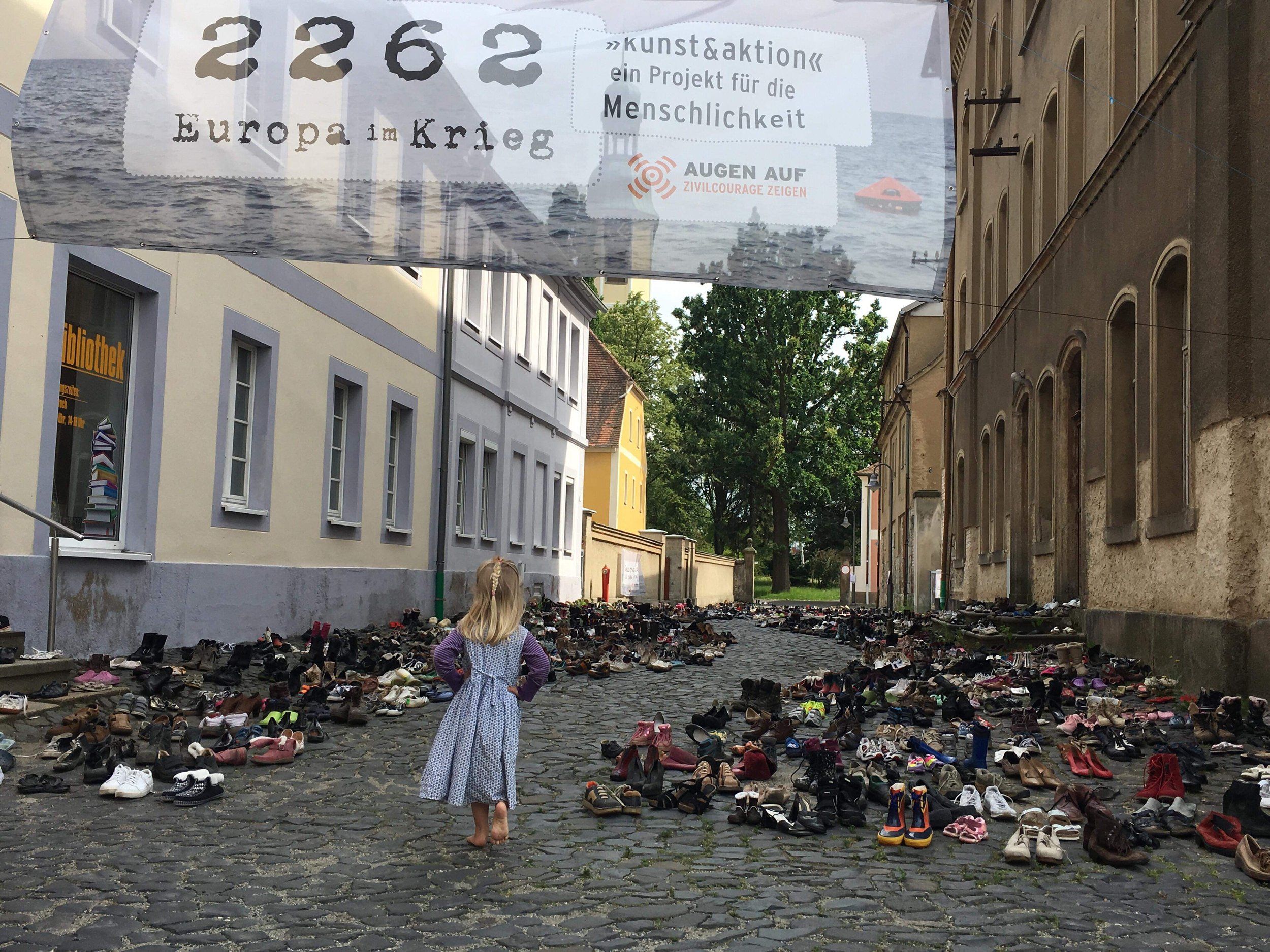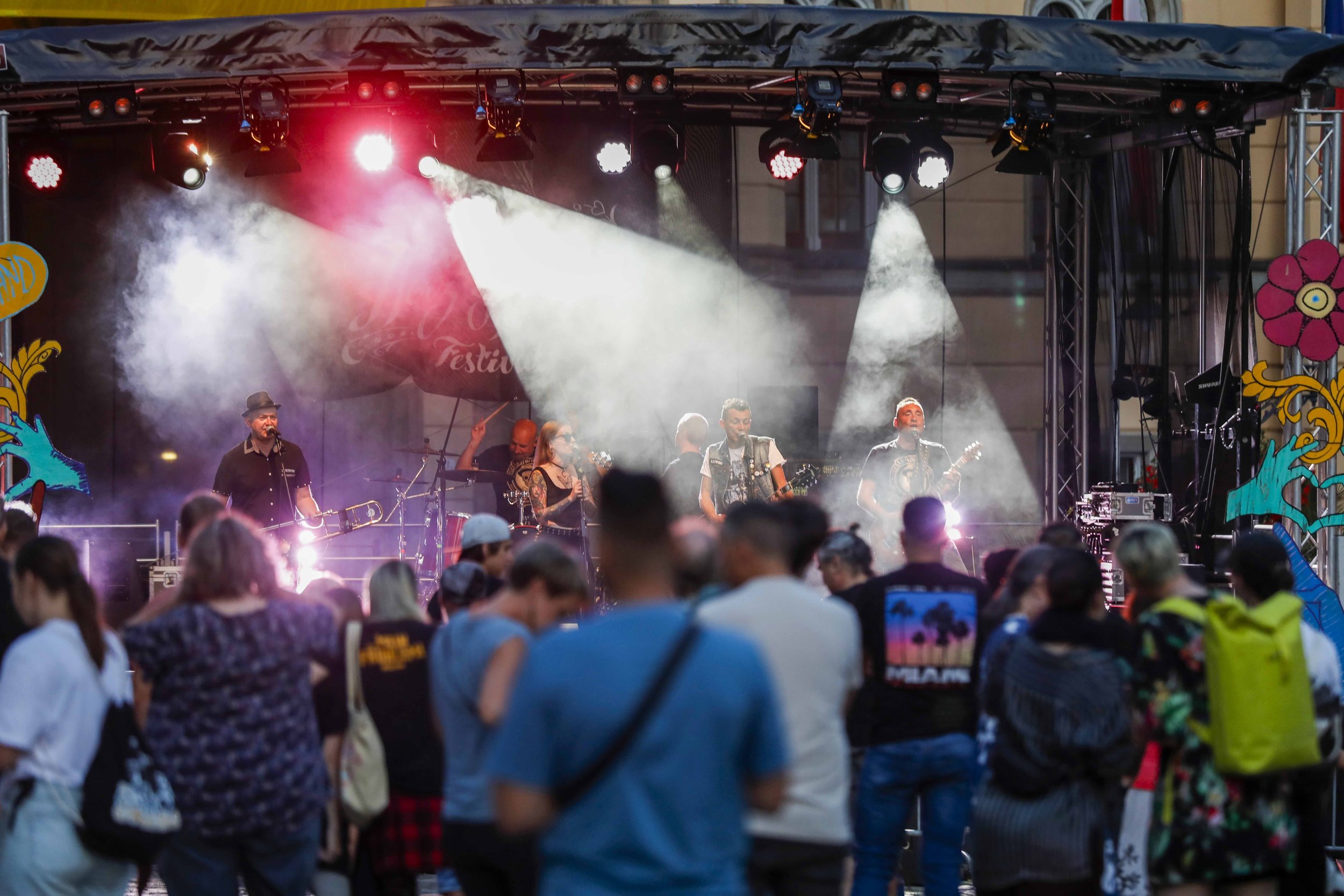“We have a problem, and we cannot keep quiet.”
Augen Auf e.V. focuses on helping immigrants and combating bigotry and extremism
by Toby Axelrod
“The wild, wild east” — it aptly describes former East Germany in the decade after German unification. Right-wing bullies were running rampant, targeting minorities, foreigners, homeless people, and other vulnerable groups.
That was true in Zittau, a small city in the state of Saxony in the border triangle where Poland, the Czech Republic, and Germany come together. “We had what was called the National Liberation Zone,” an area staked out by right-wing extremists, says Sven Kaseler. “There were a lot of right-wing clubs here. And they were very active and very violent.”
The situation, he says, “was often swept under the rug.” Kaseler and his friends concluded: "We have to talk about it. We have a problem, and we cannot keep quiet.”
They started organizing local projects against extremism in 2000, in Zittau and nearby towns. They established a formal association, Augen Auf e.V., in 2004. Today, the association has more than 50 members, seven part-time employees, and up to 300 regular volunteers.
Literally, its name means “open your eyes.” But this humanist organization’s volunteers don’t just see; they listen and act.
“We look for problem areas that are not being addressed, be it in schools or in communities,” says Kaseler. Their goals include helping new immigrants navigate discrimination in the job and housing markets, and rooting out antisemitism and antiziganism (aimed at Sinti and Roma people).
By teaching about the long history of the local Jewish community and its fate during the Holocaust, Augen Auf helps children and teens in local schools draw conclusions about the dangers of far-right extremism. The idea is that studying the antisemitic propaganda of Nazi Germany in newspapers and letters of that day helps students recognize and reject prejudice and exclusion in their everyday environment.
“Anyone who already has extremist ideas in their heart is no longer accessible to us. And we want to prevent that from happening.”
The guiding principle of Augen Auf is to focus on “the struggle for democracy and the fight against right-wing populism and right-wing radicalism, which also has gained a foothold in the middle of society,” says Kaseler, a product manager for the Deutsche Bahn railway system. In addition to being a founder and board member of Augen Auf, Kaseler helps represent the organization on the 150-member Network of Tolerant Saxony.
Augen Auf aims to catch people before they slip into right-wing extremism, Kaseler says. “Anyone who already has extremist ideas in their heart is no longer accessible to us. And we want to prevent that from happening.”
Augen Auf started out as a meeting place, says Armin Pietsch, 58, who works with Integration Aktiv, a spin-off of Augen Auf that works with citizens, associations, authorities, and immigrants to foster a more integrated community. “Over the years it has actually turned out that we were able to build up real trust.”
They succeeded in part because “we were so crazy, because we laughed, and because we did things that others would never have dared to do,” adds Kaseler.
Those things include an anti-racist soccer tournament called Football Without Borders, which has been running for 16 years, and a “conspiracy party” with games that help people recognize when they’re being fed lies.
If you catch someone before they succumb to conspiracy myths, you are off to a good start, says Kaseler. “I quickly think up my own conspiracy theory, so to speak, and when they say ‘you're crazy,’ that’s when I know I have them.”
Other projects include Democracy Made Strong, which supports regional communities coping with local right-wing extremism; intercultural festivals; school events (often related to the Holocaust and broader Jewish history topics); and the Café Solidarité, which has become a magnet for migrants and their friends.
“There are beautiful things”
Abualtayeb Al-Azzawi, 28, who came here from Iraq four years ago, says he first went to the Café Solidarité to socialize, to improve his German, and to get assistance with the red tape of German bureaucracy. Now he volunteers there as an interpreter, a consultant, an accountant, and an event organizer.
Recently, he volunteered to help prepare a pro-democracy festival with other groups in Zittau. He volunteered, he says, “for three weeks straight without a break, without a weekend. We wanted to show that there are beautiful things here in Saxony, in the east of Germany, not just neo-Nazis.”
About 3,000 people came to the festival, and half of the 80 volunteers were migrants like Abualtayeb, says Kaseler. “That is also a bit of the fruit of our years of work in integration. You laugh together, you work together.”
Shoes representing refugees who drowned in the Mediterranean Sea.
Augen Auf also brings home the experience of refugees in unusual ways.
In 2018 the organization created a traveling exhibit of more than 2,000 pairs of shoes. Collected by volunteers, the shoes represented the number of refugees who drowned in the Mediterranean that year. “It touched people, it moved them… Suddenly this number was comprehensible,” Kaseler says.
Augen Auf takes a creative and unusual approach to serious topics. Since 2021 they have offered city tours through “Jewish Löbau” and “Jewish Zittau,” tracing history and confronting each city’s Nazi past, says Pietsch. With students, he has followed the routes of Jewish people in Zittau during the Nazi period, from their homes and workplaces to their deportation via Dresden to the Theresienstadt concentration camp in the former Czechoslovakia.
“And then I accompanied a school class to Auschwitz,” he says. “My strongest impressions were not even at the gate but in Birkenau at the large memorial [known as the Stone of the Martyrs]… I immediately thought of these people from my home town with whom we were traveling in spirit.”
Augen Auf also has been involved in the laying of stumbling stone memorials in the region, recognizing the last dwellings of Jewish residents before their deportation by the Nazis. In addition, they work with contemporary witnesses, have mounted photo exhibitions such as "In the Shadow of Auschwitz,” and have organized projects about the first Nazi concentration camps in Saxony.
For years Augen Auf visited schools in the district of Görlitz with journalist Erika Rosenberg, biographer of Oskar and Emilie Schindler. She spoke about the “Righteous Among the Nations” — people who rescued Jews during the Holocaust.
For Pietsch, his early meetings with Holocaust survivors and now with their descendants “stay very, very much inside me,” he says. Today, with Augen Auf, he is listening to the stories of a different population entirely, stories of immigrants and refugees, and yet his role is much the same.
“And I was scared, too”
“We all try to speak directly to people who are affected by tragedy so that we can also pass on their message,” Pietsch says.
Such encounters may come at unexpected moments.
One young man opened up to Pietsch while they were making pizza together in the café kitchen. “Armin, have you ever looked inside a machine gun?” asked the young man, who had escaped from Libya.
“I looked at him and said no.”
“‘Well, I have. And I was scared, too.’”
Says Pietsch today: “It was a long road for him and for many others to finally arrive and to be able to live — I don't even want to call it a normal life. But yes, they have arrived and are still alive.”
Sven Kaseler and Abualtayeb Al-Azzawi
Abdulrahman A., 38, says his contact with Augen Auf bolstered his faith in humanity, after he fled war-torn Syria with his pregnant wife, Hevin, 36, and their four children, including twins. They traveled by foot, boat, train, and bus, arriving in Germany in 2016.
Today they live in the city of Löbau. Abdulrahman has a night job in a restaurant, and by day volunteers in the kitchen of the Café Solidarité, sometimes joined there by his wife. “There are a lot of people there, lovely people, good people. They don't have racist hearts,” says Abdulrahman.
“Germany is better than my homeland,” says Hevin. “I want my children to have a better future.”
Abualtayeb left Iraq because as a person with physical handicaps, he had been unable to pursue his dream of being an orthopedic shoemaker there. An accomplished paralympic fencer, he was also looking for a club where he could practice the sport. Augen Auf helped make connections.
Then, when Abualtayeb was looking for an apartment, they stepped in to help again.
“There is a stereotype that young men from Arab states are very, very dangerous,” says Kaseler. “When it turns out that we are looking for an apartment for a young man from Afghanistan or Syria, then I notice on the phone, the other side, their face drops a little.”
And so it was for Abualtayeb: “I was always afraid that when I introduced myself they would reject me because I am a foreigner,” he says. “Then Armin spoke to a woman on the phone and was able to persuade her.
“You always need help when you come to a new country,” Abualtayeb says. “Starting is always difficult. You shouldn't give up but keep going until you can achieve your goals.”
More than two decades after Augen Auf was founded, the social problems in the former East Germany are far from resolved. Just the opposite: the right-wing extremist, anti-foreigner political party recently won the largest percentage of votes for the Saxony parliament, and has made similar inroads in other German states.
“Nobody cares,” laments Kaseler. “It is no longer seen as a scandal” to have such a party in the government. And that’s got to change, he says. Augen Auf “gives people courage and shows them what is possible, but also what we could lose if certain right-wing circles get the upper hand.”
— Obermayer Award recipient 2025
The Heart in the Hand (Herz in der Hand) Festival, organized by Augen Auf, focused on creativity, culture, courage, and commitment.








